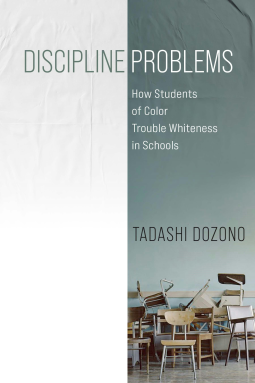
Discipline Problems
How Students of Color Trouble Whiteness in Schools
by Tadashi Dozono
This title was previously available on NetGalley and is now archived.
Send NetGalley books directly to your Kindle or Kindle app
1
To read on a Kindle or Kindle app, please add kindle@netgalley.com as an approved email address to receive files in your Amazon account. Click here for step-by-step instructions.
2
Also find your Kindle email address within your Amazon account, and enter it here.
Pub Date May 07 2024 | Archive Date Mar 13 2024
Talking about this book? Use #DisciplineProblems #NetGalley. More hashtag tips!
Description
Angel, a Black tenth-grader at a New York City public school, self-identifies as a nerd and likes to learn. But she’s troubled that her history classes leave out events like the genocide and dispossession of Indigenous people in the Americas, presenting a sugar-coated image of the United States that is at odds with her everyday experience. “The history I learned in school is simpler,” she says. “The world I live in is a lot more complex.”
Angel, like every student interviewed in Discipline Problems, has been identified by teachers as a “troublemaker,” a student whose behavior disrupts classroom norms and interferes with instruction. But her critiques of the curriculum she’s taught speak to her curiosity and insight, crucial foundations for understanding history. Like many students who have been marginalized by systemic racism in American schools, she exposes the shortcomings of her classrooms’ academic environments by challenging both the content and the methods of her education. All too often, these challenges are framed as “troublemaking,” and the students are disciplined for “acting out” instead of being rewarded for their intellectual engagement.
Tadashi Dozono, a professor of education and former high school social studies teacher, takes seriously the often-overlooked critiques that students of color who get labeled as troublemakers direct toward their high school history curriculum. He reinterprets “troublemaking,” usually cast as a behavioral deficit, as an intellectual asset and form of reasoning that challenges the “disciplining reason” of classrooms where whiteness is valued over the histories and knowledge of people of color. Dozono shows how what are traditionally framed as discipline problems can be seen through a different lens as responses to educational practices that marginalize non-white students. Discipline Problems reveals how students of color seek out alternate avenues for understanding their world and imagines a pedagogy that champions the curiosity, intellect, and knowledge of marginalized learners.
Tadashi Dozono is Assistant Professor of History/Social Science Education at California State University Channel Islands.
Available Editions
| EDITION | Paperback |
| ISBN | 9781512825251 |
| PRICE | $29.95 (USD) |
| PAGES | 200 |
Available on NetGalley
Average rating from 1 member
Featured Reviews
How do we define "problem kids" in school? They're the kids who are disruptive, who aren't going to class, who are argumentative, starting fights. And they're "handled" by suspensions and detentions and being labeled as "bad." But does anyone ask them WHY they're acting out, or missing class? Has anyone asked what they can do to improve their outcomes?
I love ethnography, and as an anthropologist myself, this brought up some really interesting points. I grew up in a very different demographic make-up than this school (I grew up in a very white midwestern area vs. a majority Black/Hispanic neighborhood in NYC), but this made me reflect on what school was like growing up, and how the "bad" kids were treated, and who they were. Dozono interviewed a dozen students 3 times, trying to understand why they were acting out and reframing this behavior--these children are not trouble makers, they're trying to see the world through a different lens and navigate a system that was not created for them or with them in mind. And they're getting to tell their own stories, in their own words, to people who usually brush them aside and count them out.
This was a fantastic read that I think all teachers and those who work with children of all ages would benefit from. Lived experiences are important, and understanding how yours is different from those you're teaching may shift not only how you teach, but how you think and understand the next generation. For an ethnography, this was very accessible and easy to read--I wish we had gotten more from each of these kids, and I would LOVE to see where they all are in 5 or 10 years.



